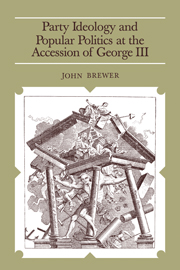Book contents
- Frontmatter
- Contents
- Preface
- A note to the reader
- PART I INTRODUCTION
- PART II THE RECONFIGURATION OF POLITICS
- 3 Whig and tory
- 4 Opposition and the proprietary parties
- 5 From Old Corps to Rockinghamite whigs: the emergence of a party
- 6 Pitt and patriotism: a case study in political argument
- 7 Ministerial responsibility and the powers of the Crown
- PART III AN ALTERNATIVE STRUCTURE OF POLITICS
- PART IV FOCUSSED RADICALISM
- PART V TWO POLITICAL NATIONS
- PART VI CONCLUSION
- Notes
- Bibliography
- Index
6 - Pitt and patriotism: a case study in political argument
Published online by Cambridge University Press: 15 December 2009
- Frontmatter
- Contents
- Preface
- A note to the reader
- PART I INTRODUCTION
- PART II THE RECONFIGURATION OF POLITICS
- 3 Whig and tory
- 4 Opposition and the proprietary parties
- 5 From Old Corps to Rockinghamite whigs: the emergence of a party
- 6 Pitt and patriotism: a case study in political argument
- 7 Ministerial responsibility and the powers of the Crown
- PART III AN ALTERNATIVE STRUCTURE OF POLITICS
- PART IV FOCUSSED RADICALISM
- PART V TWO POLITICAL NATIONS
- PART VI CONCLUSION
- Notes
- Bibliography
- Index
Summary
The popular Cry by Whigs and Tories, Jacobites and Revolutionists is Patriotism, but by what little I see, at this vast distance I am from the Great World, the bottom of them All, in Church as well as State; (like Hell and the Grave, ‘Give, Give!’) is Self. Give them but a Place, Pension, Government- Contract, or Mitre, and farewell Patriotism!
(‘The Ministry in the Suds’ (1774), 15)Throughout his checkered career William Pitt, subsequently Earl of Chatham, cast himself in the role of patriot. He played the part with immense panache (one of the reasons why the theatrical metaphor is so appropriate) and exploited its political advantages to the full. Unfortunately, however, neither Pitt's political position nor his political intentions during the 1760s could be as readily accommodated to this patriot ideal as they had been earlier in his political career. After the accession of the new king, and as the configuration of politics changed, so the patriot stereotype became as much a liability as a political advantage. Pitt's problem was quite simply that certain of his actions, and here the obvious instances were his acceptance of a pension in 1761 and a peerage in 1766, could easily be construed or attacked as incompatible with the tenets of true patriotism. In these years Pitt was hoist with his own petard.
- Type
- Chapter
- Information
- Publisher: Cambridge University PressPrint publication year: 1976
- 2
- Cited by



